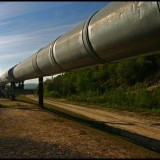The high-profile sponsorship of a BC cancer research charity event by the world’s biggest oil pipeline builder raises serious questions about the ethics of fundraising – and threatens to backfire for both organizations involved.
Unless you never open a newspaper, turn on the TV, listen to the radio, or surf the web, you have likely recently come across glossy ads for the “Enbridge Ride to Conquer Cancer”. The 2012 “Ride” will be the fourth for the annual event, with similar rides taking place in Alberta, Ontario and Quebec as well. This year’s and last year’s major sponsor is none other than controversial oil pipeline giant, Enbridge – who want to build the highly unpopular Northern Gateway Pipeline from the Alberta Tar Sands to a supertanker port at Kitimat on BC’s north coast.
Here’s how the event’s organizers describe it on their website:
“The Enbridge Ride to Conquer Cancer® is a unique, two-day cycling event to take place on June 16-17, 2012. During this bold cycling journey, you will ride for two days through the scenic Pacific Northwest! Our vision is clear – A World Free From Cancer.”
Having long had the impression that oil – during its life cycle, from extraction through refining, transport, inevitable spillage and ultimate burning – can cause cancer, I naturally felt it hypocritical that a cancer-fighting organization would accept money and sponsorship from a Big Oil company.
So I called the Canadian Cancer Society’s BC Chapter to grill them. Upon doing so, though, I discovered that the Society – that high-profile organization most often associated with cancer-related philanthropy in this province – has nothing to do with the event. Moreover, the woman I spoke to there acknowledged it was hardly the first time they’d dealt with this confusion.
You see, the proceeds from the Enbridge Ride to Conquer Cancer flow to the BC Cancer Foundation, not the Society. A little more research taught me that the BC Cancer Foundation is the fundraising arm of the BC Cancer Agency, which is a BC government department – under the Provincial Health Services Authority.
So the proceeds of the Enbridge Ride to Conquer Cancer go, ultimately, to the BC government!
You might ask why I wasn’t more careful in reading the shiny ads for the Ride, which clearly display (though in tiny print) the BC Cancer Foundation, right there in black and white…Well, actually, not black and white, but yellow and blue.
In fact, the banners, posters and commercials for the Enbridge Ride are all in yellow and blue. An interesting choice, given that neither the corporate colours of Enbridge (gold and red) nor the Cancer Foundation (purple and green) are yellow and blue. No, yellow and blue would be the colours of the Cancer Society.
A huge coincidence, I’m sure. Nothing to do with giving citizens who see these ads the false impression that this event benefits the much better-known and highly regarded Cancer Society. (Yeah, right!)
The reason I know it’s all just a big coincidence is that Enbridge isn’t a multi-billion dollar oil company pushing a highly controversial pipeline through BC and wouldn’t be a company looking to do some PR damage control, and certainly wouldn’t have access to sophisticated marketing people who understand the subconscious power of branding, who, in turn, would never consider using the brand of one of BC’s most beloved non-profits, without its permission, to greenwash their company’s activities…No more then a filmmaker and writer, such as myself, would use sarcasm to make a point!
Having ascertained that this event actually represents an alliance between Enbridge and a BC Government agency – through its fundraising foundation – I contacted the BC Cancer Foundation with a few questions. Here is a sampling of my correspondence with their PR rep, Allison Colina:
Damien Gillis: Is it hypocritical for your organization to accept sponsorship from a company who deals in a known cancer-causing product? (as worded in my initial phone conversation with Ms. Colina’s colleague)
Allison Colina: With regards to petroleum products causing cancer, we turn to the research and clinical experts at the BC Cancer Agency to determine what are cancer-causing substances…According to the World Health Organization, there is no conclusive research at this time that indicates that petroleum products cause cancer.
DG: …[Does] your organization [feel] it is problematic to be associated with such an unpopular company and project in BC (polls show upwards of 80% of British Columbians are opposed to oil tankers on the BC coast and Enbridge’s proposed project has been highly controversial, as you well know)?
AC: Our Gift Acceptance Policy is approved by our Board of Directors and guides management and employees in accepting gifts from a wide variety of donors and sources, and ensures that the Foundation maintains a strong base of financial support. Examples of prohibited gifts include gifts from tobacco companies, or gifts from the proceeds of crime. Since Enbridge came on-board as sponsor of the Ride to Conquer Cancer in 2010, our participation numbers have grown and we have been able to focus on our goal of a world free from cancer by directing significant funds to leading-edge research at the BC Cancer Agency thanks to the Ride.
Ms. Colina declined to divulge the dollar value of Enbridge’s sponsorship upon my inquiry. I also asked her about the Precautionary Principle – providing the example of electromagnetic radiation (EMF), which up until recently was not considered a possible carcinogen by the WHO but is today. She declined to deal with that question directly.
Upon reading Ms. Colina’s emailed answers to my questions, I decided to do a little research into the carcinogenicity of petroleum products. Was I simply mistaken in my understanding of the health implications of oil and its derivatives?
I turned to the WHO’s list of known, probable and possible carcinogens to see if there was any truth to Ms. Colina’s assertion that “according to the World Health Organization, there is no conclusive research at this time that indicates that petroleum products cause cancer.”
Well, it turns out the International Agency for Research on Cancer – the WHO subsidiary group that produces the list of carcinogens Ms. Colina referred to – does indeed list “Petroleum refining (workplace exposures in)” as a probable carcinogen and Benzene, a byproduct of petroleum, as a known carcinogen.
I then contacted Dr. Karen Bartlett of the UBC School of Environmental Health, posing to her the same question: To what extent can petroleum products be considered carcinogenic? Here’s what she told me by phone:
“There are two major petroleum products that we know are associated with carcinogenicity. One is in the distillation process of petroleum products, which produces Benzene. Benezene is carcinogenic. The other is in the combustion of diesel. Diesel particulate is carcinogenic.”
Let’s also consider the Campbell/Clark Government’s own admissions regarding the health impacts of burning fossil fuels – diesel truck fuel, to be specific.
The following statement didn’t specify any particular diseases or health impacts – it was speaking in a general sense of overall health outcomes. In the government’s submission to the environmental assessment process for its then-proposed (now under construction) South Fraser Perimeter Road truck highway from Deltaport, the Ministry of Transportation acknowledged vehicle emissions from the highway – which passes within 500 meters of 16 schools and near many homes and workplaces – would result in increased human illness along the route.
They of course found a silver lining to all this, writing : “With increased air pollution there can possibly be increased employment (e.g., in the health sector) because of the economic activity associated with correcting the results of its impacts.” (Technical Volume 16, page 39)
So perhaps cancer and asthma are in fact good for the economy, which makes the BC Liberals’ support for the Enbridge pipeline – and acceptance of their own government agency taking money from the same company – more understandable.
That too was sarcasm – in case you missed it.
In closing, I don’t mean to suggest that cancer research isn’t of vital importance – or to impugn the efforts of the event’s organizers and participants. Surely the funds raised will go to a good cause. And surely those cyclists working hard to raise pledges for the event are doing an admirable thing which they believe in.
What I question is whether it is ethical for an organization battling cancer to accept a large donation from a company whose products cause cancer, which they do. Far from acknowledging what the WHO and many other scientists and doctors from around the world suggest, the BC Cancer Foundation prefers to misrepresent the WHO’s position and to utterly disregard the Precautionary Principle, which would suggest you don’t wait for 100% confirmation when peoples’ lives are at stake.
Moreover, is it appropriate for this organization to offer Enbridge the opportunity to greenwash its severely embattled image in BC by dishonestly associating itself – through savvy marketing and manipulation of the public – with the reputation of the Cancer Society, which in fact has nothing to do with this event?
Make no mistake, that is precisely what Enbridge is up to with its sponsorship of this event – and the BC Cancer Foundation and BC Government’s Cancer Agency well know it, or most certainly should. And if this sponsorship in anyway helps to mollify public opposition to the ghastly Enbridge Northern Gateway Pipeline, then lives may be lost as a result – if it helps to get the pipeline built. That’s why this matters. And why it’s not okay to say this money goes to positive ends and leave it at that.
This money may in fact go to very negative ends, if one examines the bigger picture and considers the implications of being complicit in greenwashing the expansion of the Alberta Tar Sands, the eventual certainty of ecologically disastrous oil spills via the pipeline and tanker traffic on our coast, and the increase of carbon emissions, air pollution and climate change – all of which cost lives.
The question now is how will the public, knowing the true nature of this scheme, choose to respond to the Enbridge Ride to Conquer Cancer? If more people understood what Enbridge was up to – if the BC Cancer Foundation and BC Government were to hear loudly from the public on this matter – that would effectively nullify what Enbridge is trying to do with this event. It might even backfire and cause the company even more problems as it enters the critical public comment phase of the National Energy Board review of its pipeline proposal, this coming January.
Campaigns and movements thrive on specific challenges to direct their energies toward – this could very easily become one of them.


